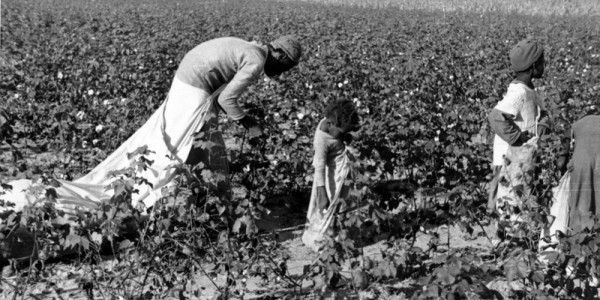I use the individual-level records from my own family in rural Mississippi to estimate the agricultural productivity of African Americans in manual cotton picking nearly a century after Emancipation, 1952-1965.
That is from Trevon Logan’s Presidential address to the National Economics Association.
Partly he calculates the productivity of his sharecropping ancestors relative to slave holding estates a century before (a persistent question in American economic history). But mainly he makes an argument for doing more qualitative interviews, which seems like an obvious point, except that systematic qualitative work is the exception in economic history (as it is in development economics).
That richer, fuller picture reveals that the work behind the estimates came to define the way that the Logan children viewed racial relations, human capital, savings, investment, and nearly every aspect of their lives. We learn not only about the picking process itself, but that chopping cotton may have been the most physically taxing aspect of the work. Similarly, the sale of cotton seed during the picking season was an important source of revenue for the family, and yet this economic relationship with the landowner was outside of the formal sharecropping contract. We also learn that it is impossible to divorce the work from its social environment{ an era in which Jim Crow, segregation, and other elements of overt racial oppression were a fact of life. Although none of the children has picked cotton in more than forty years, this experience continues to govern their daily lives and the way they interact with the world around them. Rather than being an item of the past, the work recorded in the cotton picking books continues to be a salient factor in their current economic decision-making.


20 Responses
. But mainly he makes an argument for doing more qualitative interviews, which seems like an obvious point, except that systematic qualitative work is the exception in economic history (as it is in development economics).
golu dolls
golu dolls
RT @TrevonDLogan: Black lives matter, economic history edition – Chris Blattman https://t.co/4hZ7noAZsC
RT @EthnoTopics: An economic historian uses interviews + own family records to study sharecropping in rural Mississippi. @cblatts https://t…
RT @TrevonDLogan: @DarrickHamilton @drlisadcook @NEAEcon @SandyDarity @rodmccullom @SociologistRay https://t.co/4hZ7nojo42
RT @TrevonDLogan: @DarrickHamilton @drlisadcook @NEAEcon @SandyDarity @rodmccullom @SociologistRay https://t.co/4hZ7nojo42
RT @TrevonDLogan: @DarrickHamilton @drlisadcook @NEAEcon @SandyDarity @rodmccullom @SociologistRay https://t.co/4hZ7nojo42
RT @TrevonDLogan: @DarrickHamilton @drlisadcook @NEAEcon @SandyDarity @rodmccullom @SociologistRay https://t.co/4hZ7nojo42
RT @TrevonDLogan: @DarrickHamilton @drlisadcook @NEAEcon @SandyDarity @rodmccullom @SociologistRay https://t.co/4hZ7nojo42
RT @TrevonDLogan: @DarrickHamilton @drlisadcook @NEAEcon @SandyDarity @rodmccullom @SociologistRay https://t.co/4hZ7nojo42
RT @TrevonDLogan: @DarrickHamilton @drlisadcook @NEAEcon @SandyDarity @rodmccullom @SociologistRay https://t.co/4hZ7nojo42
RT @TrevonDLogan: Black lives matter, economic history edition – Chris Blattman https://t.co/4hZ7noAZsC
@DarrickHamilton @drlisadcook @NEAEcon @SandyDarity @rodmccullom @SociologistRay https://t.co/4hZ7nojo42
Black lives matter, economic history edition – Chris Blattman https://t.co/4hZ7noAZsC
Black lives matter, economic history edition: I use the individual-level records from my own family in rural … https://t.co/wjfvJ9EHCO
RT @cblatts: This black economic historian on using own family’s sharecropping records to learn about race & economics https://t.co/LkHYSgA…
An economic historian uses interviews + own family records to study sharecropping in rural Mississippi. @cblatts https://t.co/a156VXfsCl
RT @cblatts: This black economic historian on using own family’s sharecropping records to learn about race & economics https://t.co/LkHYSgA…
RT @cblatts: This black economic historian on using own family’s sharecropping records to learn about race & economics https://t.co/LkHYSgA…
RT @cblatts: This black economic historian on using own family’s sharecropping records to learn about race & economics https://t.co/LkHYSgA…
RT @cblatts: This black economic historian on using own family’s sharecropping records to learn about race & economics https://t.co/LkHYSgA…